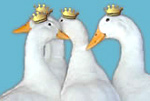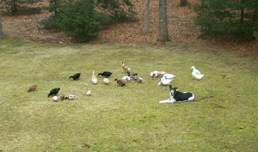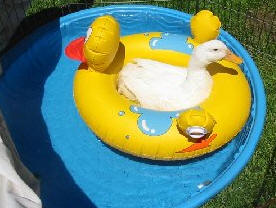SEA-DOO!
AT LAST! During our first
years of inception we spent a lot of time on shore trying to
lure ducks and geese up onto land in order to safely remove
them from dangerous waters. It often took weeks to complete
a rescue and sadly some animals did not survive that long. A
couple of years later, we received two kayak
donations, which greatly improved our effectiveness in
smaller bodies of water. And now--we finally have our own jet
ski! This is going to make the impossible rescues
possible!
We have borrowed jet skis in the past
and within minutes we have rescued animals safely and
effectively. We are thrilled to finally have this kind of
rescue gear on hand here whenever we need it. This will
enable us to act quickly and rescue quickly, saving more
lives!
We will still be using our kayaks for
smaller bodies of water and we will also continue to use
them in combination with the jet ski. Kayaks are used to
veer ducks and geese out into deeper water where the jet ski
is effective. The kayaks prevent birds from trying to hide on
shore.
This $250 purchase was made possible
thanks to the generosity of our supporters, to the seller who dropped
his
price from $1000 for our charitable cause and especially to
our dear, dear friend Uncle Lew who handled all of
the negotiations involving this purchase and made the arrangements to have
this vital rescue equipment delivered right to our
sanctuary's barn
door.
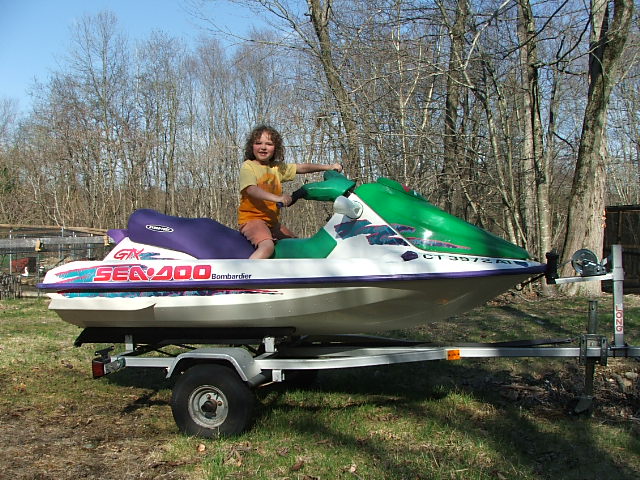
Isabel
climbs aboard our new Sea Doo which we have dubbed:
"The Sea Duck!"
Crocodile
Stanley
Wishing belated well-wishes to Croc
Stanley's new family who successfully treated "One-eyed
Jack" for a prolapsed penis. Thank you for all your kind
devotion in seeking out professional medical assistance that
was vital to his recovery. Thank you also for doting over
him and getting him on his feet again. Best wishes to Croc &
Dolly!
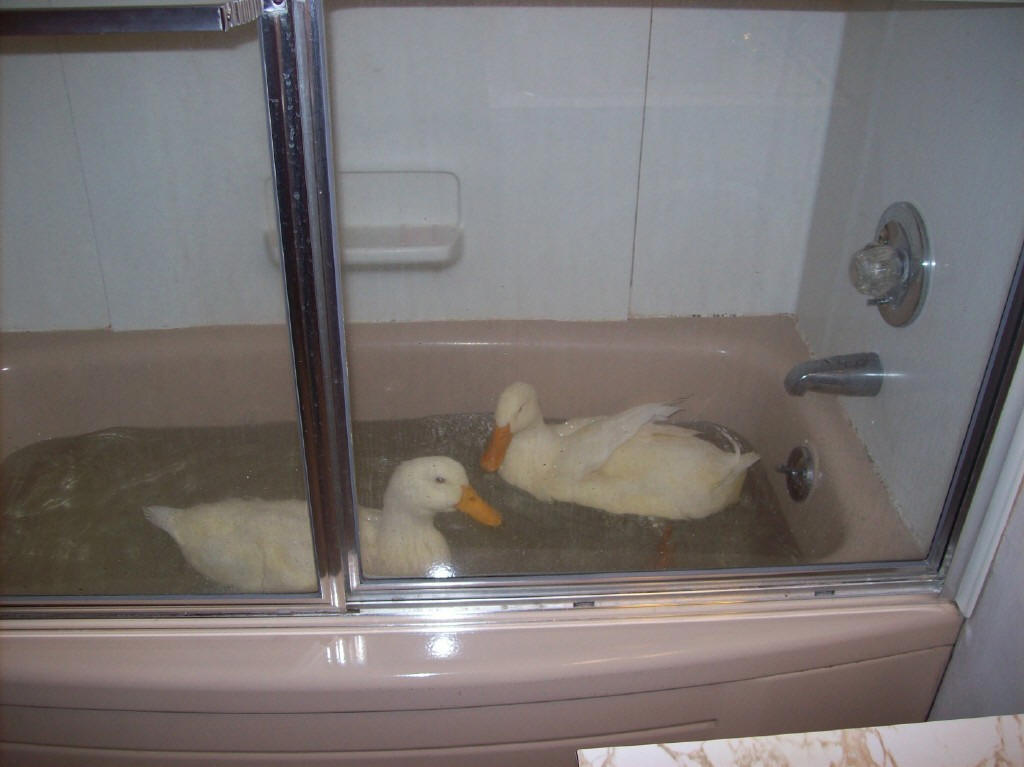
Thank you also to
Caroline for all of your loving guidance and for helping to
keep Croc's belly full with tube feedings during his
recovery.
Certified Humane
Raised & Handled
Egg
producers don't believe people are interested in purchasing eggs
from humanely treated chickens. This is why they have not changed
their ways. Chickens are one of the least protected farm animals and
the only way to change this is to change the way you shop.
If you want
to help send the message to egg producers that we want their
birds treated humanely, then it is time to buy products labeled:
Certified Humane Raised & Handled.
While
shopping mindfully, be
wary of: "Cage Free
Eggs." The term Cage Free Eggs does not mean chickens are
being treated humanely; in fact, they sometimes live in worse conditions than caged
birds.
Do your own
research and look for the label:
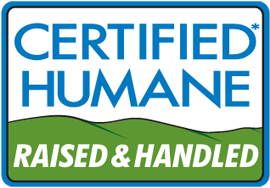
Learn more here:
www.certifiedhumane.com
Parasites:
Capillaria spp.
After going years with
negative fecal exams on our incoming ducks and
geese, we came up against another recent
positive when Jack Frost arrived at our
sanctuary. And when we learn something at
Majestic, we share it with you.
Capillaria spp. are a type of
nematode (or roundworm)
that can be found in the esophagus, crop or small
intestine of waterfowl.
Capillaria
plica (renamed: Pearsonema plica)
are hairlike in appearance and are often
referred to as "hairworms" or "bladder worms."
Eggs expelled in the urine or feces are not
infectious. In fact, infection depends on
earthworms as an intermediate host. Once the eggs
hatch and larva are present, your duck or goose
ingests the earthworm and becomes infected with
hairworm.
Capillaria
aerophilia (renamed: Eucoleus aerophilus)
is very similar in appearance to a whipworm (Trichuris
vulpis) and is found in the respiratory tract and
transmitted from bird-to-bird through fecal exposure. It too
can be introduced via the consumption of earthworms or
naturally through drinking water in nature. As with C.
plica, symptoms may not be apparent except in large
infestations or in younger birds.
Symptoms:
C. plica
infestations tend to be self-limiting and often
do not have any noticeable symptoms. The number
of eggs expelled often reduces daily and may
self-resolve as the cycle ends. However, in
severe cases, symptoms can include diarrhea
and/or weight loss. Meanwhile, symptoms of C.
aerophilia can include
chronic coughing and in severe cases, pneumonia.
Because it is difficult to
differentiate the different species of
Capillaria, if a fecal test shows positive for
the parasite, vets will assume your bird has
C. aerophilia and prescribe treatment.
Diagnosis: The presence of
Capillaria can be confirmed by providing a stool sample to
your vet for a fecal flotation to check for the presence of
eggs. Although adult worms may be seen in the feces, with so
many types of parasites out there, only a vet (or their lab)
can determine exactly which kind of worms your bird has and
then prescribe the appropriate treatment regime.
Treatment:
Treatment for both types of Capillaria
is the same. Our vet prescribed a dose of 10 mg of fenbendazole (Panacur)
for every 2.2 lb. that Jack Frost weighed. Liquid Panacur is
ideal for measuring this small dosage.
We administered this dosage of liquid
Panacur orally, once a day
for 5 days. We waited two weeks during which time no
treatment was administered. After the two weeks waiting
period, we gave him one single and final dose of
liquid Panacur. Three days after this
second treatment, a follow-up fecal test should be done to
ensure the eradication of this parasite.
If follow-up fecal testing reveals the
infestation is not cleared up, a single dose of 200
micrograms of Ivermectin for every2.2 lbs of your bird's
weight can be given orally
to resolve the issue for good. This should be done under
your vet's guidance as well.
Remember:
-
Thoroughly clean infected pens
and houses
-
Remove contaminated
soil
-
Remove and replace
any
bedding (hay) every day throughout the entire treatment period.
-
Remove stools daily
(at a minimum)
-
Worms are
vulnerable to sunlight and drying; use this knowledge to
your advantage.
-
For best results,
after your birds are free of worms, remove them from the
pen and turn over the infected
soil to a depth of 8-12 inches. Seed new
grass and allow it to grow in, giving the pen a few
weeks resting period. When the grass is fully
re-established, return your birds to the area.
Roundworms can be very contagious,
so be sure to clean all tools, gear and equipment thoroughly
with a 10% bleach solution and
adhere to a strict quarantine routine until the problem is
thoroughly resolved.
Keep in mind, Panacur effectively
removes capillaria worms from your duck or goose's body, but
it does not necessarily kill all stages of these parasites. It
mostly helps your
bird to expel them. Practice caution to avoid re-infection
of your bird or spreading these roundworms to other pens and animals--or
to humans.
Prevention:
-
Keep pens clean
-
Ensure you have
good drainage in your pens
-
Avoid overcrowding
your waterfowl
-
Change the
locations of their water buckets regularly
*Thanks again
to Michele for helping us understand this parasite more
thoroughly, interpreting test results, confirming treatment
options and dosages, offering extremely helpful advice
regarding quarantine considerations, providing emotional
support, and finally, thank you for editing this article for
us!
Veterinary
Care
Dr. Brian Speer, DVM: Former
President of the Avian Vet Association, Dr. Speer is a vet
and
expert surgeon, arguably one of the best in the country and
is willing to consult directly with other veterinarians.

Medical Center for
Birds
Brian Speer,
DVM
3805 Main Street
Oakley CA 94561
(925) 625-1878
Email:
avnvet@aol.com
Mobile Avian
Surgical Services
Dr.
Scott Echols, DVM: Dr. Echols is another top vet and
surgeon. He is currently working through Dr. Speer's office
and will consult and provide mobile avian surgical services.
At your expense, he will fly out to operate on your duck or
goose.
 Mobile Avian Surgical Services
Mobile Avian Surgical Services
Scott
Echols, DVM
(925) 625-1878
30th Annual
AAV Conference & Expo
Dr.
Scott
Echols, DVM will be including a segment on Duckology at
this year's
Annual Association of Avian
Veterinarians Conference & Expo.
If you
or any veterinarians you know are planning to attend this
conference, please ask them to continue to encourage the
inclusion of ducks and geese healthcare in their training!



